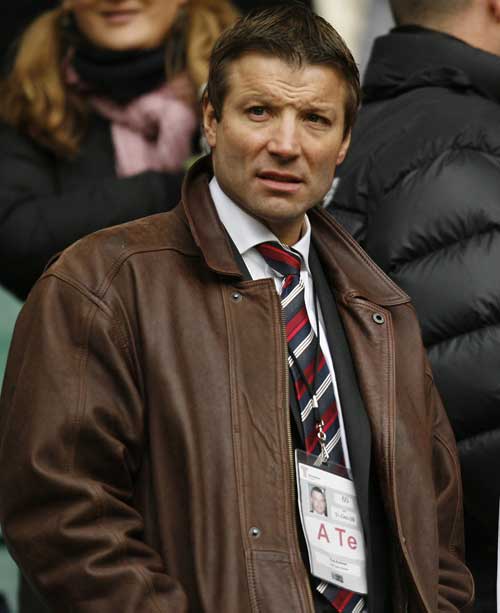Andrew in firing line but coaches look safe

In a week when the England manager, Martin Johnson, had a go at a referee and then his players, there remained only the issue of coaching left to scrutinise. In the short term, at any rate. The role of director of elite rugby, currently held by Rob Andrew, will be in the gift of a new Rugby Football Union chief executive to succeed Francis Baron in the summer; hence the speculation over a return for Sir Clive Woodward.
Between now and then, Johnson will take a squad of 44 to Australia and New Zealand in June for five matches, including two Tests against the Wallabies and a fearsome season-ender against the Maori. The sight of Johnson glowering and towering over the Kiwi referee Bryce Lawrence after England's final Six Nations match in France last weekend drew comparisons on the BBC TV coverage with moaning football bosses Arsène Wenger and Sir Alex Ferguson. When it came to a Six Nations review with the press on Wednesday, Johnson branded criticism of his coaches as "ill-informed" and pinned some of England's shortcomings in finishing third with two wins and a draw on "player error".
The RFU have a record of flirting with big-name coaches without closing the deal. They went to New Zealand to talk to Graham Henry in 1997, but he chose Wales (some say he was asked initially to coach only England's A team). Another Kiwi, Warren Gatland, was standing by the phone at the time of the 2007 World Cup, having been told Andrew would be in touch – the call never came. Jake White, after winning that World Cup with South Africa, gave every sign he was up for a job; nothing doing. Shaun Edwards was in Martin Johnson's mind as an attack coach when Johnson became manager in summer 2008, but it didn't happen. Before that, Edwards was dismissive of an RFU offer of a part-time role with the A-team Saxons. Nick Mallett claims to have been offered the director's job which went to Andrew, but didn't fancy the lack of control over England's team.
And so here we are, with the untried Johnson as manager, Brian Smith as attack coach and the nearest thing to a head coach, with John Wells (forwards), Mike Ford (defence) and Graham Rowntree (scrum). The group met on Thursday at a hotel near Johnson's Leicestershire home for a review of the "positives and negatives" of the past season. It is up to Johnson, who has RFU support through to the 2011 World Cup, whether the review would prompt changes. He said he did not "anticipate" any, and though the semantics left some wriggle room, one coach said: "That's the way I understand it. For the moment, we've got to try and turn some of these results round."
Several statistics from the Six Nations showed England worse off than third: tries scored, ratio of tries to line breaks, missed tackles and tackle completion among them. They were bottom of the pile on turnovers won, ruck clearances, offloads in the tackle and scrums lost. But no team conceded fewer tries (five), which counts in Ford's favour, or made fewer errors. It led Johnson to claim "an extra five per cent as a team... would turn those close games into wins".
Wells has been England's forwards coach since 2006 and he believes the example of the men coaching Australia and New Zealand is instructive. "Robbie Deans [of Australia] had a young side which had lost its leaders," said Wells. "He was getting as much criticism as us but he stayed loyal to his team. Graham Henry and the All Black coaches lost one match in a World Cup and everyone wanted them out, but the NZRU stayed with them."
The England coaches point to injuries to loosehead props Andrew Sheridan, Matt Mullan and Jon Golding as reason for persisting with the much-maligned Tim Payne, who they say offers more around the field than Bath's David Flatman. They argue that youngsters such as the scrum-half Ben Youngs and lock Courtney Lawes are being brought through at the correct pace. And Wells rejected another gripe, that the former Leicester Tiger should visit some Premiership clubs more often. "A lot of the contact gets done on the phone," he said. "I see the players I need to see."
Subscribe to Independent Premium to bookmark this article
Want to bookmark your favourite articles and stories to read or reference later? Start your Independent Premium subscription today.

Join our commenting forum
Join thought-provoking conversations, follow other Independent readers and see their replies